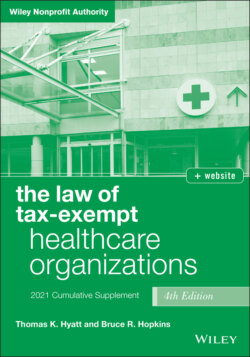Читать книгу The Law of Tax-Exempt Healthcare Organizations - Bruce Hopkins R., Bruce R. Hopkins, David Middlebrook - Страница 28
*§ 8.6 PANDEMIC RELIEF (NEW)
ОглавлениеThe Coronavirus Aid, Relief, and Economic Security (CARES) Act was passed by Congress with bipartisan support and signed into law on March 27, 2020.57 The $2.2 trillion relief package was designed to provide emergency assistance and healthcare response for individuals, families, and businesses affected by the 2020 coronavirus pandemic. The CARES Act is the largest economic stimulus package in U.S. history.
The CARES Act authorized emergency loans to distressed businesses, provided funding for forgivable bridge loans under a Paycheck Protection Program, provided stimulus funding in the form of $1,200 Economic Impact Payments (as direct payments or tax credits) to individuals, with additional $500 payments per qualifying child, and established special rules for certain tax‐favored withdrawals from retirement plans. The Act also delayed due dates for employer payroll taxes and estimated tax payments for corporations, and revised other provisions of the Internal Revenue Code including those related to losses, charitable deductions, and business interest.
Regarding health care, the CARES Act provided funding for the prevention, diagnosis, and treatment of COVID‐19; limited liability for certain volunteer healthcare professionals; prioritized the review of certain drugs by the Food and Drug Administration; permitted the emergency use of certain diagnostic tests not previously approved by the FDA; increased health‐insurance coverage for diagnostic testing and required coverage for certain preventive services and vaccines; and addressed other critical healthcare needs in responding to the pandemic including through the medical supply chain, the national stockpile of healthcare equipment and supplies, the healthcare workforce, telehealth services, and Medicare and Medicaid.
Included in the overall relief package were $175 billion in Provider Relief Funds, which provided funding to healthcare providers to supplement lost revenue resulting from state‐mandated cessation of elective surgeries and outpatient services and to cover additional expenses providers incurred in responding to the COVID‐19 pandemic. These funds are not subject to repayment provided that healthcare providers receiving them meet specified criteria.
